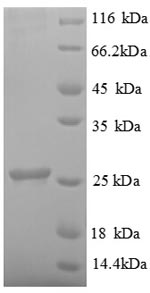Human Ubiquitin-conjugating enzyme E2 K Recombinant Protein Product Attributes
Product Type: Recombinant Protein
Recombinant Ubiquitin-conjugating enzyme E2 K based upon sequence from: Human
Host: QP8668 protein expressed in E. coli.
Tag: His
Protein Construction: A DNA sequence encoding the Homo sapiens (Human) Ubiquitin-conjugating enzyme E2 K, was expressed in the hosts and tags indicated. Please select your host/tag option, above.
Application Notes: Please contact us for application specific information for QP8668.
Bioactivity Data: Untested
Full Length? Full Length
Expression Region: Ala2 – Asn200
Amino Acid Sequence: ANIAVQRIKR EFKEVLKSEE TSKNQIKVDL VDENFTELRG EIAGPPDTPY EGGRYQLEIK IPETYPFNPP KVRFITKIWH PNISSVTGAI CLDILKDQWA AAMTLRTVLL SLQALLAAAE PDDPQDAVVA NQYKQNPEMF KQTARLWAHV YAGAPVSSPE YTKKIENLCA MGFDRNAVIV ALSSKSWDVE TATELLLSN
Purity: Greater than 90% as determined by SDS-PAGE.
Reconstitution Instructions:
Concentration of Human Ubiquitin-conjugating enzyme E2 K Protein:
Endotoxin Levels: Not determined.
Buffer: Tris-based buffer, 50% glycerol
Storage Conditions: Store at -20C to -80C.
| Recombinant Human Ubiquitin-conjugating enzyme E2 K Protein General Information | |
|---|---|
| Alternate Names | |
| LIG; E2-25K; HIP2; HYPG; UBC1 | |
| Curated Database and Bioinformatic Data | |
| Gene Symbol | UBE2K |
| Entrez Gene ID | 3093 |
| Ensemble Gene ID | ENSG00000078140 |
| RefSeq Protein Accession(s) | NP_001104582.1 |
| RefSeq mRNA Accession(s) | NM_001111112.1, NM_001111113.1, NM_005339.4 |
| UniProt ID(s) | P61086 |
| UniGene ID(s) | Hs.50308 |
| HGNC ID(s) | HGNC:4914 |
| COSMIC ID Link(s) | UBE2K |
| KEGG Gene ID(s) | hsa:3093 |
| PharmGKB ID(s) | PA162407874 |
| General Description of Recombinant Human Ubiquitin-conjugating enzyme E2 K Protein. | |
| Accepts ubiquitin from the E1 complex and catalyzes its covalent attachment to other proteins. In vitro, in the presence or in the absence of BRCA1-BARD1 E3 ubiquitin-protein ligase complex, catalyzes the synthesis of ‘Lys-48’-linked polyubiquitin chains. Does not transfer ubiquitin directly to but elongates monoubiquitinated substrate protein. Mediates the selective degradation of short-lived and abnormal proteins, such as the endoplasmic reticulum-associated degradation (ERAD) of misfolded lumenal proteins. Ubiquitinates huntingtin. May mediate foam cell formation by the suppression of apoptosis of lipid-bearing macrophages through ubiquitination and subsequence degradation of p53/TP53. Proposed to be involved in ubiquitination and proteolytic processing of NF-kappa-B; in vitro supports ubiquitination of NFKB1. In case of infection by cytomegaloviruses may be involved in the US11-dependent degradation of MHC class I heavy chains following their export from the ER to the cytosol. In case of viral infections may be involved in the HPV E7 protein-dependent degradation of RB1 | |
Limitations and Performance Guarantee
This is a life science research product (for Research Use Only). This product is guaranteed to work for a period of two years when stored at -70C or colder, and one year when aliquoted and stored at -20C.




There are no reviews yet.